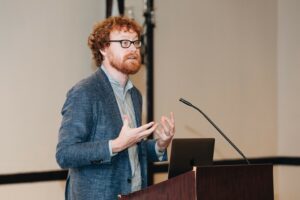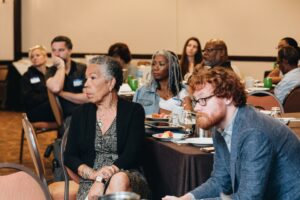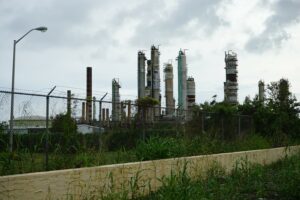Engaged Anthropology Grant: David Bond

In 2010 David Bond received a Dissertation Fieldwork Grant to aid research on, “Hydrocarbon Frontiers: Experts and the Social Life of Facts at a Caribbean Refinery,” supervised by Dr. Ann Laura Stoler. In 2019 Dr. Bond returned to St. Croix when he received an Engaged Anthropology Grant to aid engaged activities on, “St. Croix After HOVENSA”.
Saint Croix stands at a climate crucible. For the past 50 years, the HOVENSA refinery on Saint Croix – for a time, the largest in the world – generated enough wages and tax revenue to support the US territory in the Caribbean. Such fiscal wealth came at tremendous environmental cost, and in 2011 the EPA uncovered a litany of egregious lapses that culminated in a record-breaking $700 million dollar fine against the refinery. A few months later, the refinery shutdown abruptly, forcing massive cuts to the territorial government budget and sending the islands economy into steep decline.

Five years later, with Saint Croix still in a tailspin, an unprecedented Category 5 hurricane hit the US Virgin Islands. Two weeks later, a second Category 5 hurricane slammed into Saint Croix damaging 90% of the buildings on the island and wiping out all the public infrastructure. Weighed down by the destruction of fossil fuels in environmental and climate form, Saint Croix now stands at a crossroads: many residents want to break away from fossil fuels and rebuild their island in a radically sustainable way yet state officials seem intent on doubling down on fossil fuels as the only way to generate the funds needed to rebuild and buttress the island against the coming storms. A climate crucible, one with immense stakes for those on the island and of wider significance for the rest of the world struggling with how to face up to the challenge of climate change.

I was asked if I might visit the island in June 2019 to join a community conversation about how to best navigate these issues. Support from Wenner Gren helped make that visit possible, and allowed me to share findings of previous research with community leaders and chart out new lines of collaborative research with the community. An essay I wrote about the history of fossil fuels on the island became a minor actor in the unfolding drama (“Oil in the Caribbean,” Bond 2017). My research for this essay uncovered some of the refineries egregious environmental lapses and the backstory on the $700 million EPA settlement that was sidestepped and then brushed aside after the refinery closed. Although my essay hardly made a splash in the scholarly fields it addressed, about a year after it was published I started getting emails from Saint Croix. Folks on St. Croix told me it provided a new language for their lives, that it explained the history they lived and felt but didn’t know how to explain and confront. I don’t know of any higher praise for work in the social sciences. This past June, I visited the island to participate in an Environmental Forum convening on the island to discuss climate resilience and sustainability on the Saint Croix. Local environmental leaders asked me to give a keynote address that would share the arc of my essay with local leaders and key stakeholders, and then participate in a multi-day discussion of where the island might go next. It was truly an honor to spend a few days brainstorming with such a group of spirited leaders. Support from an Engaged Anthropology Grant from Wenner Gren also enabled me to conduct additional research in conversation with community concerns to publicize this climate crucible to wider audiences and advance more equitable and sustainable change on the island.
More about the St. Croix Foundation Environmental Forum can be found here.